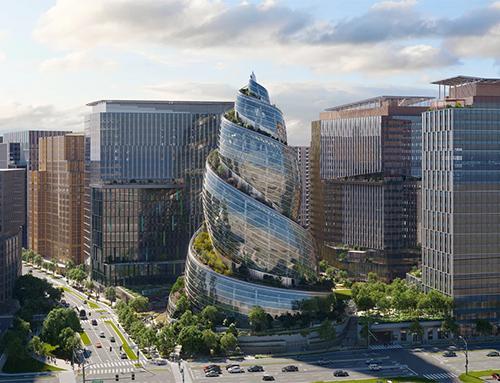Amazon’s second headquarters to be 100% powered by renewable energy
Amazon is previewing the sustainable aspects of its soon-to-open “HQ2” complex in Arlington, Va.
In a corporate blog post, Amazon highlighted sustainable features of the campus, including low-carbon concrete, mass timber, electrified energy-efficient operations, advanced ways to reuse water, and two acres of landscaped roofs with native plants.
In 2018, Amazon announced it would spend more than $2.5 billion to build a second headquarters in Arlington, Va. In 2021, the company unveiled plans for phase one of the project, known as Metropolitan Park, or “Met Park.” In 2022, the Arlington County Board gave unanimous approval to Amazon's plans to build 350-ft. office tower, called “The Helix,” as well as several other office towers and park space, as part of phase one.
Plans to open the first phase of the new campus in June 2023 are still moving forward, but Amazon is reportedly delaying groundbreaking on the second phase in a cost-cutting move.
The new HQ2 complex is 100% powered by renewable energy, offering what Amazon says is 24% overall energy savings relative to a comparable new office building, or enough electricity to power 572 homes in the U.S. every year.
Amazon also achieved a 20% reduction in the carbon footprint of HQ2’s concrete structures compared to the industry baseline, which it says saved over 14,700 metric tons of carbon, or the equivalent of taking more than 3,200 cars off the road in the U.S. for an entire year.
The complex is also certified as Targeting Leadership in Energy and Environmental Design (LEED) Platinum—the highest level of LEED certification, and is on track to be the largest LEED v4 Platinum building in the U.S.
Other highlights include:
- 100% powered by renewable electricity procured from a solar farm in Virginia.
- Technology to reclaim and recycle water for elements like cooling towers, landscape irrigation and flushing fixtures.
- Two acres (or 90,000 square feet) of landscaped green roofs with native planting, offering the natural cooling functions of plants.
- 82% of all construction materials were diverted from landfills, including concrete, drywall, metals, wood, cardboard, and plastic. This process kept over 17,000 tons of material from entering landfills.
“Constructing buildings that can house thousands of employees on a daily basis, while operating more efficiently—and not disrupting, but rather enhancing the natural environment—is no small feat. I’m proud of the work our teams have done with HQ2 to make that a reality,” said Kara Hurst, VP for worldwide sustainability at Amazon.
“While it’s not always necessarily visible to our customers or communities, we’re working to decarbonize all of Amazon’s buildings—including our corporate offices, data centers, and fulfillment facilities—given the climate impact of the built environment." Hurst said. "At HQ2, we challenged ourselves to push the limits of what’s possible when it comes to sustainable construction and design—and we’re proud to share these features with the northern Virginia community.”



